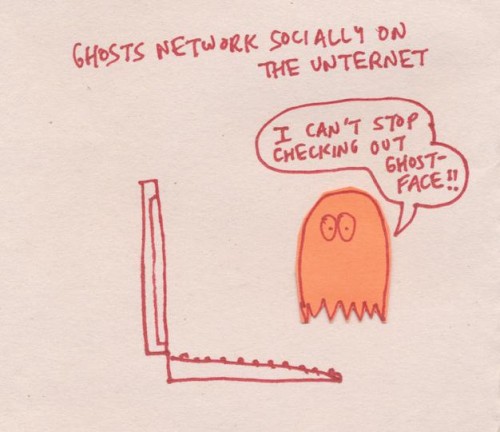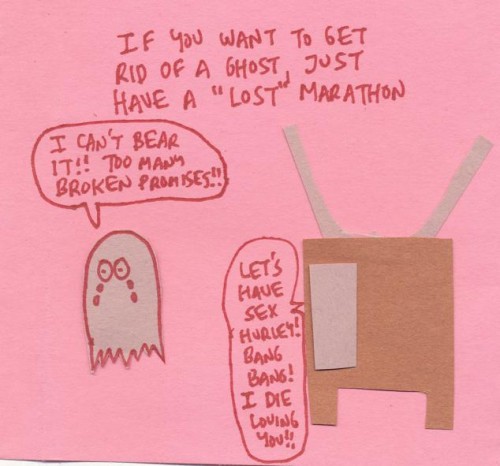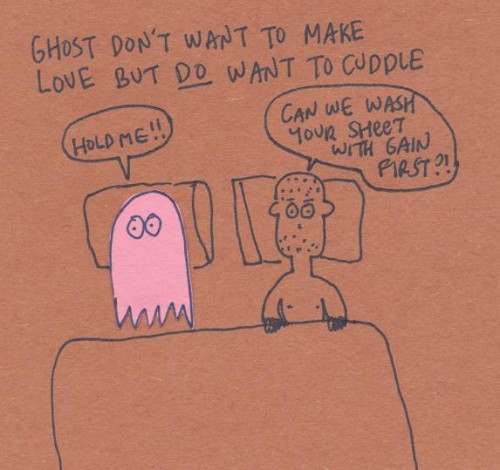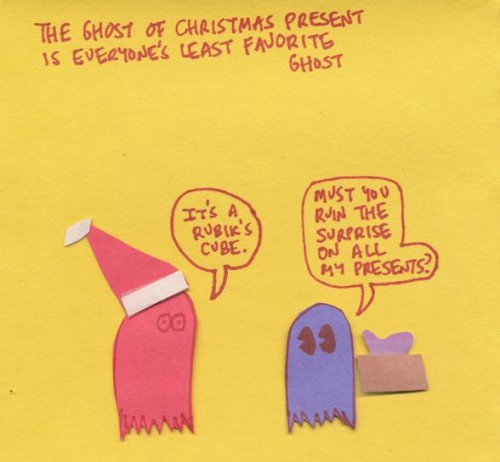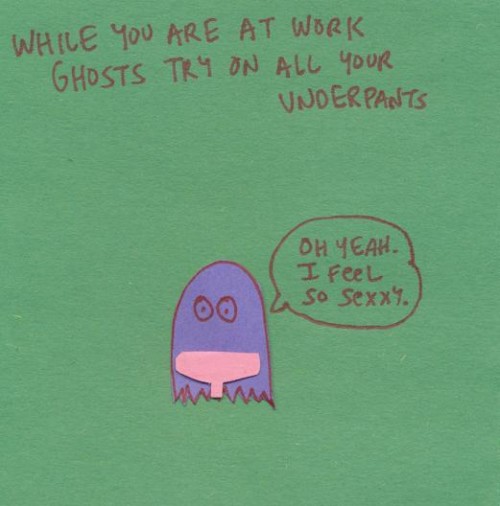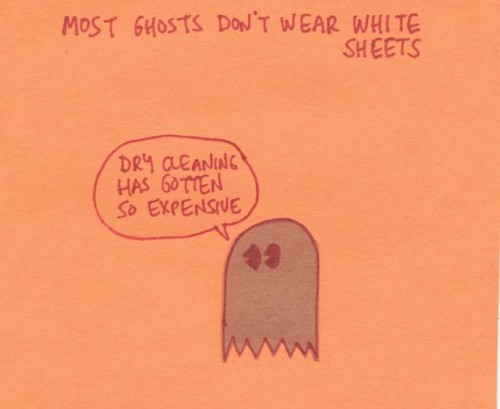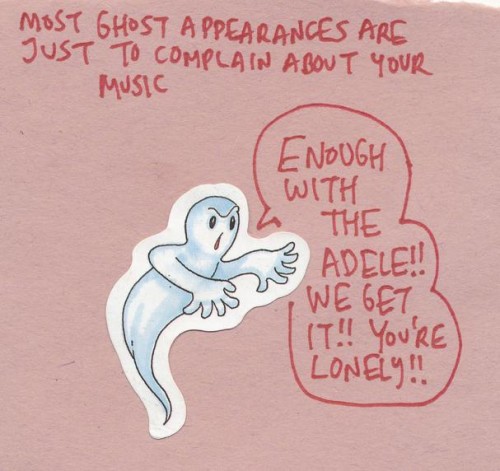Chappy Chanukah
http://player.vimeo.com/video/8109589?title=0&byline=0&portrait=0
From us to you, baby. Without you, every night we spin our own dreidels, but we’re never satisfied. Here’s a reminder of what should have by now absolutely become a Festival of Lights watching tradition. (via)
Wham!'s "Last Christmas" Is the Most Horrible Holiday Song Ever Made
by Tom Keiser
Christmas songs are designed to be catchy, annoying and vaguely reminiscent of winter. The most successful are horrible holiday earworms, such as “Wonderful Christmastime” and “Heat Miser/Snow Miser.” But one song is so overplayed and over-covered and so mediocre to begin with that it makes the rest sound like “White Christmas.” Its recent exclusion from the A/V Club’s recent list of worst Christmas songs is a gross injustice to the holidays and to musicdom in general.
“Last Christmas,” written by George Michael and first performed by Wham! in 1984, is a wallowing mess of a song. It mistakes self-indulgence for closure. It contains a synthy falseness that would make even Paul McCartney and Wings wince. And with all that, still “Last Christmas” is an okay song — compared to the countless covers one is subjected to during the holidays. There are, to date, nearly 500 of them.
The emo generation of the last decade co-opted “Last Christmas” as their own; Jimmy Eat World’s cover was the first time that many people who weren’t around in the late-early 80s discovered it. And then its status as a Muzak standard further turned it into an object of hatred. “I heard at least 5 different versions and I thought that was weird,” said Alex Liebold of Last Christmas, which chronicles the ruthless rise of this new holiday standard.
Now it’s five years and 485 versions of “Last Christmas” later. “It’s hard to listen to the same song over and over even it’s by different people,” said Liebold, who works in advertising when not hearing the same song over and over. “There are guys who keep asking me about the song and I basically do it because they love it.”
Jon Solomon is known for the annual 24-hour Christmas music marathon he does on Princeton University’s radio station, WPRB. He works months in advance to find music for this tradition.
“For whatever reason, covers of ‘Last Christmas’ that pop up along the way have become one of my least favorite parts of previewing recordings for my 24-Hour Holiday Radio Show,” he wrote. “Listening to ‘Last Christmas’ is like having a fairly unpleasant-tasting syrup cover you drip by drip down the top of your head.”
“The idea of listening to all 479 versions of the song gives me actual chills,” Solomon wrote. (Bad news: there’s been six new versions since we corresonded.) “So many people sing it like they’re in a community theater’s musical.”
Somewhere during Jon Solomon’s impassioned invective against “Last Christmas,” he realized that his record label, My Pal God, included “Last Christmas” in a holiday compilation in 1998.
In general, most of these covers don’t make it out in the wild. I regularly hear only three versions of ‘Last Christmas.” I can’t even pinpoint the artist, but I’m guessing Wham!, Ashley Tisdale and Satan.
Still, some versions of “Last Christmas” are better than others. Liebold likes variations on a theme: “The worst in general are the straight covers of the original…. It’s just pretty boring. You might as well listen to the original.” When pressed for good versions, he suggests covers by Sasketchewan and Minuteman.
https://www.youtube.com/watch?v=xfTnI4YV2to
Minuteman’s version, he said, has “real flow and builds from beginning to end into something.”
Solomon is least annoyed by Swearing At Motorists’ rendition, but has a special place in his heart for a popular cover: “At least Taylor Swift’s version is shorter.”
And then there are people who aren’t annoyed by what Wham! have wrought. Purists who, of course, prefer the original.
“OMG, of course! GEORGE MICHAEL FOREVER,” wrote Village Voice music editor Maura Johnston, by digital means. “i have been team wham! since i wrote ‘maura ❤s wham!’ on my copy of ‘make it big’ in second grade.” And who hasn’t ❤’d Wham!? George Michael, circa “Faith,” was a deep generational mancrush. Watching old solo and Wham!-era videos now, Mr. Panagiotou is simultaneously cheesy and sexy — and aware of it. But the song’s problems are thornier. What holiday is “Last Christmas” commemorating, anyway? It could very well be called “Last Birthday” or “Last Festivus” or “Last Freedom ‘90.” A criminally neglected Facebook page even states the case upfront: “Wham’s ‘Last Christmas’ IS NOT A CHRISTMAS SONG!” Though it’s not the only holiday song of that ilk. “Jingle Bells,” originally written with Thanksgiving in mind, has no mention at all of any holiday — although also its lyrics don’t devolve into lovelorn self-pity. At least with Band Aid’s “Do They Know It’s Christmas?,” which also features George Michael, they actually state, at the very beginning, that it is indeed Christmastime.
It actually doesn’t matter if “Last Christmas” has much to do with the birth of Jesus Christ or the arrival of Santa Claus. The holidays are about withstanding annoyances small and large in order to be/because of being with loved ones; to make sure that the good will outweigh the bad. The “someone special” George Michael is singing about may be about as real as his love for the girl in the video, but he at least partially realizes that love is what the holidays are all about. Now, if only barking dogs could cover “Last Christmas.”
Tom Keiser lives in New Jersey and his favorite holiday song is “Mistress For Christmas” by AC/DC.
2011: The Year Animals Did Stuff
What a year it’s been for animals! It’s hard to believe it was a mere twelve months ago when the animals got together and decided that this was going to be the year that they did stuff. And boy did they ever! Will 2012 be filled with as much stuff-doing by animals as this year was? Only a fool would venture to predict. But until then, we can always relive the magic of the stuff the animals did this year with this video, a tribute to stuff and its doing. Enjoy, everyone! Except those of you who get squicked out by that cat with two faces, who shows up pretty early here. You guys might want to just look away.
The Google Goblins Give Firefox a Reprieve -- But What About the Open Web?
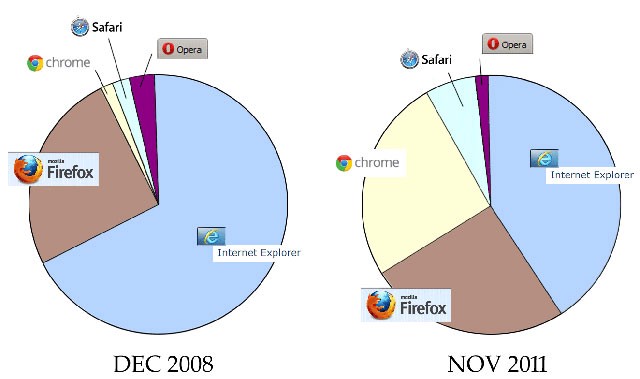
Data from StatCounter.
Did you know that most of Firefox’s budget comes from Google? That is because Google pays the Mozilla Corporation, the for-profit arm of the Mozilla Foundation, a share of ad revenue gained by displaying Google as the default Firefox search engine. By most, really, one means “almost all”: in 2010, 84% of Mozilla’s royalty revenue came from Google, and royalties counted for $121 million of the Foundation’s $123 million in income. Pretty good sugar.
The agreement expired in November. (It first expired in 2006, was renewed through 2008 and then again through 2011.) The rapid growth of Google’s Chrome browser threatened the survival of Firefox. There was no obvious need for Google to continue to subsidize a principal competitor. This caused much handwringing — until this afternoon, when Mozilla announced, at last, that it had signed a “new agreement” to keep Google as its default search partner for another three-year period.
Few of us have ever paid for a browser, so it’s hard to think of this in terms of ordinary business competition, but that is in fact what it is. And to the victor will belong the spoils of the enemy. With three years of deal in place, the prospects for the (sort-of) nonprofit Mozilla browser look better. And what happens beyond that?
You are also welcome to read this later with Instapaper.
In an ideal world — an ideal world which will apparently exist until at least 2015! — we’d be able to continue to search the Internet ad-free — or at least, browse ad-free. This is a public good that affects everyone; I, for one, would welcome a government initiative to produce an ad-free, not-for-profit search engine; an ad-free, not-for-profit digital library. We have the resources but not the political will to make things like this happen; understandably enough, since the political will is difficult to muster in an America where about half of our “representatives” represent not their constituents, but their corporate masters.
Nobody who uses the Internet will deny that web users owe a debt to the engineers of Google. At the same time, Google has grown dangerously big for its colossal britches. Right now, in addition to its search engine, Google owns YouTube, Chrome, Google Books, Blogger, Picasa, Feedburner and Gmail and God knows what else, that’s off the top of my head. Google bought at least 26 companies in 2011, across a broad spectrum of business activities. Google’s ambitions do not stop there; their biggest acquisition so far, at $12.5 billion, was this August’s purchase of Motorola Mobility; they’ll be making proprietary phones and tablets next (though it’s said this purchase was made in order to secure the zillions of patents owned by Motorola). There’s no end to their resources, and correspondingly no limit to their attempts to dominate of every aspect of our lives online — which, increasingly, means our lives, period. Do we really want a single profit-making entity in control of this much of the Internet?
Google recently paid for a study carried out by Accuvant which concluded that Chrome is the “safest” browser against malicious attacks. And doubts arose not only because of the sensitivity of the recent negotiations between Mozilla and Google; the study drew criticism for having perhaps been specially designed to favor Chrome at the expense of Firefox.
But here we are, with Mozilla’s main income stream extended again. It gives Mozilla three years to grow the foundation’s fund further and look at new options. Meanwhile, one thing Google can do, for better or for worse, is spend money and not much notice doing so.
* * *
A substantial number of the Internet honchos with whom I spoke during this period didn’t seem worried about the future of Firefox — partly because the mobile browser market is dominated by the open source WebKit rendering engine and its derivatives, which include Android as well as Safari and Chrome, and mobile is the future, everyone seems to think. Furthermore, Microsoft and its Bing search engine were surely poised to replace Google’s alliance with Mozilla. Certainly there have been tentative moves in that direction already. (In addition, the Mozilla Foundation has a good amount of cash on hand.)
But even Android is not so open source as we’ve been led to believe; Google seems to be trying to have it both ways, playing the part of public benefactor, enjoying the open source “we’re the good guys” PR while maintaining what amounts to very tight control over the software’s development (here’s a good chart illustrating how).
Open source doesn’t necessarily preclude corporate control. Nowadays most open source code is produced by professional software developers working for big companies. Times have changed since Linus Torvalds first set out to create an unpatented and unpatentable operating system; as of 2006, two percent of the current Linux kernel had been written by Torvalds himself.
Jimmy Wales called it. “I think Firefox still has a strong negotiating position,” Wales, founder of Wikipedia, wrote in an email. “I think Google won’t let them go. Bing is ready and raring to go, well funded, and the aggregate share of the browser market held by all versions of Firefox is still 25.3% according to Statcounter. Does Google really want Bing front and center for hundreds of millions of users?”
A good point, except that Bing sucks so hard it draws blood. You can’t sort standard search results by date in Bing. There is somewhat less SEO pollution than there is in Google search results but, big deal, when Google is apt to return ten or fifteen times the number of relevant results that Bing does, and date-filtered if you want. Bing’s news results are anemic compared to Google’s. There is no blog search function at all. And let’s not even get into Google Books, which, I mean, that alone. If I were Google, I can quite easily imagine not caring two pins about Bing, at least in is current state.
It’s hard to see how an alliance in 2015 between Bing and Firefox would benefit Mozilla much, or harm Google. If it is a revshare deal like the Google one, it’s beyond likely that Mozilla’s revenues will plummet anyway, because Firefox users will quickly learn to hop over to the Google website for their searches, leaving Bing without much rev to share.
* * *
So what, right? Why should we care about this? Well, we should care because these huge companies — Google, Amazon and to a lesser extent, Facebook — are increasingly in a position to wreck the Internets we’ve come to love and rely upon over the last 20 years. When the benefits that accrue to citizens come into conflict with the profit-making ambitions of the corpocracy, it has long been clear who will lose, absent an almighty fight. The unstable future of a dominant nonprofit, open-source browser is cause for concern to anyone interested in the preservation of the open web.
What is meant, exactly, by this phrase, “the open web”? Kip Hampton, author and Perl wizard, says it means a combination of three factors:
1) Free and open source servers and publishing tools, which means you don’t need money to publish web pages, provided you have Internet access;
2) Transport protocols and other technical specifications that are not encumbered by patent or copyright claims (so that tools like browsers, servers, etc. can be freely implemented by anyone who is willing to put in the time to develop them); and
3) The general assurance that connecting to the Web means the ability to connect to all of it, without some intervening public or private authority filtering/blocking/throttling access to sites and other resources they don’t like.
There are a lot of potential choke points there that could be exploited by a monopolistic corporation — one, say, in absolute control of browsers and search at the same time. In the U.S., attempts to kill the open web are being made not by political forces, but by forces intent on making you pay (or does that maybe come to the same thing?). Let’s follow this out.
As Chrome gains the monopoly it seeks in the browser market — Chrome 15 just now became more popular than Internet Explorer 8 and Firefox, by some counts — that will create a very different set of problems from those posed by the earlier dominance of Microsoft’s IE browser. Microsoft, unlike Google, never managed to stake out a controlling position in the search business; the nature of search is such that it automatically affects both online retail and social networks to a significant degree.
Even today, business software is Microsoft’s bread and butter. Once Microsoft has sold you a copy of Windows or Office, that’s it, you don’t pay for it again until a new and useless set of upgrades comes along to be shoved down your throat. That is a very old-school manner of going about things that is liable to break down in the nearish future.
Because, in stark contrast, Google’s business is the flow of information. When you watch a video on YouTube, Google makes money; on every Google search you perform, Google makes money; when you check your Gmail, even, Google makes a tiny bit of money, because there is an ad on there (for example, the one I just saw for the DeVry for-profit “university,” which when you think about it, this whole thing is liable to make you pretty ill, one way and another, because you can’t help but think, look, wouldn’t it be better to pay something for these services, so maybe I wouldn’t be a party to all these underprivileged kids getting tricked into a lifetime of hock to a load of tax-avoiding for-profit jerk-offs?).
Anyway, the point here is that Google’s true business is not search, but advertising. More than 96 percent of Google’s $29 billion in revenue last year came directly from advertising. Google makes more from advertising than the whole country’s newspapers combined. But Google News isn’t producing a newspaper; it’s aggregating and distributing and sometimes even propagating the results of work done by now-starving newspapers.
So. Ugh! The real question is, once they’ve got us by the cojones, what happens next?
Google does not have to stay free forever. (Free of charge, I mean. They are plenty free in the sense of unconstrained, what with their roaring Niagara of lucre and their eight corporate jets.) There is nothing to stop Google charging us for their services tomorrow.
We’ve never had to pay for a search engine yet, but if Chrome should take over completely, or nearly so, from Firefox and IE, that is a not-at-all-unlikely scenario. Google could absolutely forbid its search engine to any browser other than Chrome, for example, and if Google search maintains its absolute dominance — likely, for the foreseeable future, given that not even Microsoft with all its bazillions has succeeded in launching a viable competitor — no browser that literally does not include Google search would be usable, really. At that point Google could institute a paywall, of some sort. I think, really, would institute a paywall.
But that’s not even the worst thing that could happen if Chrome were to achieve more than, say, an 80% market share. The worst thing is that then Google would be in a position to determine even more basic aspects of our ability to communicate on the web. (Theoretically, they threaten the open web even now, for they may conceivably be able to control who is able to see what websites just by shutting undesirables out of the Google search engine — or by promoting desirables to the top of results.)
Google seeks to host every document you write and every email you send, they want to show you every book, host your blog, host your photos, answer all your questions. Google offers, apparently, a competitor to Groupon. What the heck. I do not want the entire Earth to be blanketed in products made by Google, Apple, Amazon or any other soi-disant “builder” of “cool applications.”
But that’s what nearly of all today’s other capitalists have done: exploit every advantage until it screams in pain, at all times. Not to have a solid business offering a good product at a fair price, not to be one among many, but to Take All and be the Winner.
Google search is the one indispensable Google product. There are tolerable alternatives to Gmail right now, and to YouTube, and there are more-than-tolerable alternatives to all the rest of Google’s offerings so far. That means that if they get too greedy, we can vote with our mice; we’re the assets, clicking and clicking, and we can take our clicks elsewhere.
But what happens when there’s nowhere left to click to? Ruin is what happens then. Things get more and more expensive and difficult, and quality crashes and burns.
Exhibit A: Facebook
The best days of Facebook are far behind it. When was Facebook’s best moment? I asked these all these youngs. One recalled, “Let me see, I was a freshman, in 2006” (causing me to inhale gin and tonic right up into my brains, practically). In 2006, because that was when you first got to put pictures up, she explained; before that, it had been just the one profile picture that you could have. “Before chat,” said another.
For me, the charm of Facebook ended when my list of favorite books disappeared. The astonishing thing about the original lists of favorite things on Facebook was that you could instantly see anyone else in the Facebook land who was interested in anything on your own list. It was so surprising to discover this. Really popular things would show tens of thousands of devotees, but so many times, there would be just ten, or 100, or even two. Once in a while it would be a friend, or a friend of a friend, who shared a hitherto unknown and unsuspected taste for The Lost Scrapbook or the solo works of Yukihiro Takahashi. A magical thing. I friended a couple of complete strangers just because they were fellow Thurber freaks. These connections were random, unmonetized, unmediated. We can still do this on the Internet now — on Twitter, say, the new home of random and improbable connections — but not on Facebook. Not any more.
One day, my list went up in smoke. Poof! Perhaps there had been some warning, but I missed it, I visited but rarely. I had no backup list; it emerged that you would have to start over. Then, I was shocked to find, the new system accepted only recommendations linking to these Fan Pages that are anything but places for serendipitous connections: they’re just marketing. Even when you’ve already met someone over a book you both like, there is a piece of the transaction to be got, if only in the form of a couple of Sponsored Posts on the right edge of the screen. Every day Facebook grows more suffocated with advertising; each interaction, each game, each moment you spend on Facebook is more and more clearly becoming like an ad-stuffed magazine, only you and your friends have to write all the editorial yourselves.
Facebook continues to “own” every bit of personal, private information we’ve ever put on there. As a nineteen-year-old Harvard student, Mark Zuckerberg offered other people’s private information (gathered from Facebook’s earliest incarnation) to a friend. I have all these thousands of emails, pictures, SMS, he bragged. “What? How’d you manage that one?” asked this name-redacted friend. Zuckerberg replied, “They trust me — dumb f**ks.” The mystery is how anyone imagines Zuckerberg to have altered his original position by one iota. He told Jose Antonio Vargas in a New Yorker interview, “I think I’ve grown and learned a lot” since those instant messages.
His company’s behavior indicates otherwise. The number of privacy scandals there is really shocking.
There are growing indications that people are fed up with the once-loved Facebook. Nicholas Carlson at Business Insider noted that revenue numbers recently leaked to Gawker look “a little light.” Light, that is, given that Facebook looks to be coming in shy of the $4 billion in revenues it would take for them to “meet expectations” in advance of next year’s IPO. $100 billion is the valuation number that has been floated for a number of months but I don’t think they’re going to get anywhere near that, for two reasons. One is the diminishing attractiveness of the feature set, as indicated above. Gone are the days when you could randomly locate some guy in Montana who loves The Book of Tea.
The other is that the bloom is off the rose for the youngs, as well, but in a very different way. Facebook was a novelty for twenty-somethings back in 2004; younger kids who grew up with it and are entering their twenties now are experiencing a certain level of burnout. They had Facebook all the way through high school, they already have two thousand “friends” and have long since grown tired of spending hours on the thing every day. For them, Facebook is liable to go the way of Hanson or Tamagotchis. It’s not a new toy, but an old one.
But even if the IPO is postponed, or Facebook is forced to take the company public at a diminished valuation (like $80 billion or something!), there is no social network anywhere that is half as pleasurable or entertaining as Facebook once was, and Facebook itself has strangled the possibility of a new one developing, at least for now.
Exhibit B: Amazon
Amazon bought the first dominant rare book search engine, Bookfinder.com, in a pretty shifty-looking deal made in 1999, and then bought the next dominant rare book search engine, the Canadian Abebooks, in 2008. If you’re surprised that Amazon owns Abebooks.com, that is understandable, since the word “Amazon” appears zero times on the home page of Abebooks.com. Perhaps Amazon is not very keen that we should realize that it is getting increasingly difficult now to buy a book online, new, used or rare, where Amazon is not getting a piece of the transaction. You’ll be paying more, that’s almost for sure, if you choose Powells or Barnes and Noble, though there are still very good deals to be had at eBay’s Half.com.
Independent booksellers have been fighting tooth and claw since the late 1990s to avoid being swallowed up by corporations, but years of struggle have seen them reduced to sharecroppers. Fees for booksellers at Bookfinder were a flat $25 per month (except for really large inventories), with no commissions, but these days booksellers must pay Amazon through the nose, with a far larger monthly fee plus a hefty commission on each sale, plus they wind up eating quite a bit of shipping costs — that is, if they want the huge preponderance of online book buyers to see their inventory. And all this was deliberate. One saw it coming, even in 1996.
And this means that struggling independent booksellers have less money to spend on inventory and on restoring books, on printing newsletters and attending auctions. It means local used bookstores close. It means fewer experts know less about fewer books. It leaves us all very much poorer.
Kip Hampton articulated our current predicament very beautifully, I thought.
The concrete short-run benefit of saving $50 at the check-out overwhelms long-run concerns about what happens when the family-owned store down the street goes under […] you can gas on ’til you’re blue in the face about walled gardens, privacy issues, and dependence upon private unaccountable profiteers who can change the rules on a whim but those abstract arguments usually crumple when pitted against peoples’ short-term needs.
[T]elling people they should do without some short-term benefit in order to gain a more important long-term one is a tough sell. Really, this is the heart of the challenge we face. People will flip over cop cars to stop some governmental agency from restricting their freedom but those very same people will willingly *give* that same freedom away to some private entity provided that they also get some short-term visible benefit in the process.
And so today we have Amazon, the biggest-box store of all, only the box is super far away where you won’t see their slave-wage employees passing out in the heat.
They say it’s an urban myth about the frog in the pan of slowly-heating water. Which I was very relieved to hear, if only because I’ve always found it so horrifying that anyone would have tried boiling a frog to find out. But it’s a story that resonates all the same. Sometimes I feel like we’re all of us in that pan, with the water having heated up to just past the steaming-Jacuzzi level.
* * *
The progress through Congress of the Stop Online Piracy Act has caused a very large number of people to sit up and take a bit more notice than usual. (SOPA has been halted for the moment in Congress, but only until Wednesday — again since canceled — but at some point there will be an attempt to weasel it through, so a call to your representative is possibly in order.)
If SOPA fails, it will be a hope-giving sign that citizens are waking up to the many dangers threatening the open web. It seems unimaginable, but it is in fact altogether possible that we won’t get to keep this miraculous thing we’ve all built and are sharing every day.
Here is a really crazy idea. What if the global Occupy movement were to unite behind Mozilla, and other open web initiatives? For example, what if Mozilla’s $100+ million Google dollars each year were to be replaced by an annual subscription paid by the many friends of the anti-corporate-greed Occupy movement around the world? You’d need 10 million people paying $10 per year, or you could have a tiered system like they have in public radio.
That is kind of how open source started in the first place, in opposition to the corpocracy. Kip Hampton described it this way:
[W]e came of age in a time when fighting the corporate stranglehold on software generally was one of *the* defining issues for anyone using or writing Open Source tools. We didn’t just use (or write) OSS software because it was there, because it was popular, or because it it was free […] there was a general agreement that we were providing an alternative to for-profit software and anything that even *looked* like it might lead to corporate control/co-option was strictly anathema. More to the point, we could just assume that everyone we collaborated with was on the same philosophical page because no-one who didn’t already “get it” would even show up in the first place.
Its a different world now. People download Firefox because it’s a great browser; even the most business-y business behemoths mostly use OSS server software because that’s what everyone uses; proprietary scripting languages and development frameworks have largely gone the way of the dodo; yet we greybeards still act like everyone who shows up is naturally “on the team” and, thus, we don’t need to explain why OSS is important.
The Occupy movement was united on the Internet. Maybe it could establish a beachhead for the survival of the open web, too.
Maria Bustillos is the author of Dorkismo and Act Like a Gentleman, Think Like a Woman.
Mosquitos Show Even Less Regard For Basic Decorum Than We Thought

“Roughly one to two minutes after she starts feeding, an Anopheles stephensi mosquito will excrete urine and preurine through the anus, at the end of the abdomen. Sometimes a drop of the fluid will form and cling to the body before falling off; when this happens, some fluid evaporates like sweat and cools the mosquito’s abdomen by almost four degrees.”
— Great. As if mosquitos could get any more disgusting and insulting and life-ruining than they already are: While they’re drinking our blood, they’re also pooping and peeing. I have a suspicion, based on personal experience and a fondness for dumb puns, that this phenomenon is especially prevalent among the particularly horrible mosquitos who feed on the humans who have for some reason chosen to live in or near the area of Brooklyn known as Gowanus.
Learn How To Shine Shoes
“Shoe care is of the utmost importance. It prolongs the life of the shoe and removes unwanted imperfections. Here’s a video that demonstrates an incredibly complete method of polishing: dust and dirt removal, conditioning, polish application, brushing, buffing, wax application, brushing and buffing. Voila — shiny shoes!”
Who Knows What About the Great Ebook Price-Fixing Conspiracy?
Blech, it’s going to take ages for the thirty-odd different class action suits against Apple and/or various book publishers and Amazon and Barnes & Noble for ebook price-fixing to get consolidated and settled, at which time, in 2018, we all get checks for 30 cents and sign away our rights to further recourse and then keep buying ebooks from this cartel. Meanwhile, there’s apparently a smoking gun, or someone who claims they saw a gun smoking, at least: a source who says he or she was privy to the actual alleged strategy for price-fixing. (This person, or others similarly situated, should feel free to email us to tell all.)
"When You Think It's Wrong, I Know It's Right": A Couple Makes A Cake
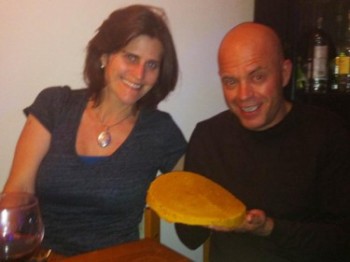
The final in a short series about sharing, caring and not going it alone. In this installment: Sarah Miller and Rob Guerin improvise, shop for and bake an amazing cake.
Sarah: When we talk about cake in this article, should we admit that we call it ‘cakie’?
Rob: Yes, but you should say that you’re the one who started calling it that. And that I never call it that.
Sarah: I don’t think that’s true. And you’re the one who really took ‘cakie’ to a new level with words like ‘ckakanie’ and ‘cakkeei’ because the iPhone spell check is so annoying that we always just have to write something even stupider than ‘cakie’ so we know that we mean not just a cake but a caakkeiieie. So, Rob, we have been making cakes together since… hmm. What was our first cake? Was it the Super Bowl where Michael Reed and Carvell and Jody came over? The first year we were together, 2009?
Rob: We made that coconut mango pineapple upside-down cake in that giant spring form that leaked goo all over the oven.
Sarah: That thing was so good.
Rob: Your friend Carvell — he was freaking out — he was like, “Oh my God, the Steelers are winning, and I am eating this cake, and it is too much pleasure.” I remember doing the syrup on that. It really got to the best temperature. It’s all about convincing the sugars to turn to caramel and the fruit to not float to the top (bottom) whatever.
Sarah: I am so glad you deal with the stuff like that because I hate dealing with stuff like that.
Rob: Such as figuring out what temperature something is by sticking a reliable instrument in it and reading the instrument.
Sarah: You don’t understand how difficult that sounds to me. It’s giving me a headache just thinking about it.
Rob: Well. You really are good at the cake part, and that’s not really my thing — it seems like one of those things you get in the rhythm of… you know how messing around with it changes the texture, and I don’t, and even though it’s detail oriented you really nail it every time. If any one person had to be tasked with all aspects of a great cake’s creation, it would be very tedious, and, I don’t know… too self-sacrificing. Dividing up the labor allows each set of tasks to get a lot more attention without losing your life to, you know, a kakkiek.
Sarah: The parts I do seem so easy to me, the rest of it that you do seems so hard.
Rob: Your inability to make sense of a measuring cup’s basic principles would on the surface make it seem that the cake part wouldn’t be your thing.
Sarah: But even though people say baking is all exact and stuff I think that’s kind of bull.
Rob: You really understand proportions and moisture and you never screw up on the baking powder or salt.
Sarah: So if you were going to describe the kind of cake we make, how would you describe it?
Rob: We always make sweet cakes that are vanilla based — we avoid chocolate because it’s too easy. We work with fresh fruit, homemade preserves or just ones from the jar, and cakes that we moisten with cream or liquor. We use a lot of vanilla in the cake part. We like intense combinations, but not too unusual. Wild plum and ginger with a little cocoa and cinnamon, passion fruit and coconuts.
Sarah: Yeah, I put in about four times the amount you’re supposed to.
Rob: And sometimes you have to make egg-free cakes or whatever for your yoga people. And sometimes I have to help you because they get screwed up because egg-free cake is crazy. And as far as like, how we do the thing… you’re the cake and I’m all the other stuff. Which is like, crazy whipped cream and fruit sauces and so on. Never frosting. Frosting isn’t in our BRAND.
Sarah: Do you remember how we started out figuring out the way we do it?
Rob: What do you mean?
Sarah: I make the cake part. You —
Rob: I’m the music, you’re the lyrics.
Sarah: I’d also say you were the art director.
Rob: (Mutters something unintelligible)
Sarah: You’re not?
Rob: I am, I am. I totally am.
Sarah: It makes me happy that you are the art director.
Rob: Well in that case I am happy to make you happy because I like being the art director.
Sarah: What’s your cake that you are most proud of?
Rob: I don’t know. I think there’s going to be a contender, but that Super Bowl cake was pretty good. But the lilikoi cake we made for Thanksgiving this year in Hawaii was pretty good too. We were very, very lucky to get that fresh lillikoi from Lea’s mother’s tree.
Sarah: The lillikoi cake was very impressive but that wild plum cake I made for your dad’s birthday was kind of exciting as well, because it was such a surprise.
Rob: But you did that one by yourself.
Sarah: Right.
Rob: So it doesn’t count. I mean, not that it doesn’t, but it’s not in this category of our words-and-music cakes.
Sarah: There’s a Drew Barrymore movie called Music and Lyrics. I have a song from it on my iTunes.
Rob: Please don’t ever play it for me. Oh, that cake we made for Violet’s birthday — with the marzipan violets. That was good.
A CAKE IS BORN
Sarah: So I thought of the cake we’re going to make for the Christmas party. Kabocha squash.
Rob: You really love kabocha squash.
Sarah: Can you live with that? Does that sound gross?
Rob: No, no. Not at all. You make a kabocha squash cake, I will come up with what will take it to the next level. But this one should just be the test cake. We’ll figure it out and then we will make the big one.
Later that day Sarah gets a text:
Rob: Pistachios. Pistachio whip cream
Sarah: oh good is that it?
Rob: no am still working on other elements
A few hours later Sarah gets another text:
Rob: mochi fondant
Sarah: I am scared of that.
Rob: Too bad
Two days later, we get out of the car at BriarPatch, the fancy organic market in our town that’s like a non publicly held Whole Foods, and happens to also have a lot of dudes that look like this guy here:

The conversation in the car.
Sarah: Look at that big giant arrow they have there right when you pull in the parking lot telling everyone to go to the right. They’re like, “Look, stupid hippies, go that way.”
Rob: I always go the wrong way here.
Sarah: So they’re like, “Look, stupid hippies, and not-hippies.”
Rob: This place is so expensive.
Sarah: It’s really not that bad. And I know how much kabocha squash and butter cost at every store in town.
Rob: That’s weird.
Sarah: And it’s the same here… less even.
Inside the store.
Rob: You get the squash, I get the pistachios and the mochi and stuff.
Rob finally finds the bulk section, convinced he has been moving quickly and keeping right on schedule. No sooner does he realize that the spices are arranged by alphabet does Sarah appear with a hand-carry basket full of: kabocha squash, lemons, butter, apples, lettuce and heavy whipping cream, on sale. Rob is reaching for the bulk vanilla bean.
Rob: How the hell did you get so much stuff so fast?
Sarah: I don’t know. I just grabbed it and put it in a basket.
Rob: You know this place too well. You told me you don’t shop here that much but I think that is a lie. Where are the pistachios?
Sarah: The pistachios are one aisle over. Or in your case, 10 minutes away.
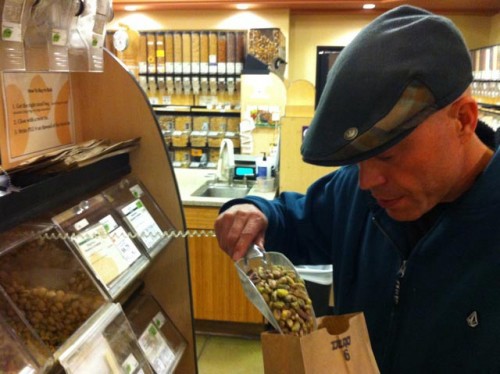
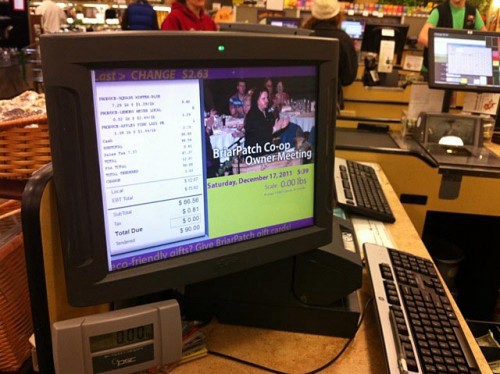
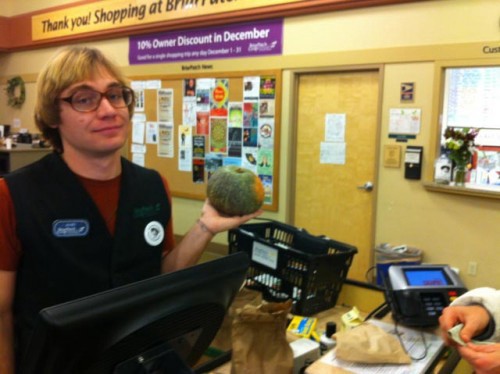
We make our purchases from Jonah, my favorite checkout person. Back at the house, we start making the cake.
Sarah: This recipe is stupid. I’m changing it. This person is making a pudding and calling it a cake. Why are people so stupid?
Rob: I trust you completely. Oh… great.
The pistachios are burned. They are dumped into the trash, where they promptly melt the plastic.
Rob: So annoying.
Sarah: Try not to think how much money just burned.
Rob: I’m trying.
Sarah: Do you think I should mash up this kabocha squash? It’s kind of lumpy.
Rob: The art director likes texture.
Sarah holds up a 7 inch long, 1/4 inch wide vanilla bean and asks with complete sincerity, “What do they mean: ‘Split it lengthwise’?”
Rob: I think they mean, “split it lengthwise.”
The phone rings. It’s Brandy, a neighbor and Sarah’s friend.
Brandy: I need to come over. My mother is driving me crazy.
Rob: You should tell Brandy about how you just asked about the vanilla.
Sarah: Because she thinks I am so smart?
Rob holds up the vanilla bean and slices it.
Rob: Look. Lenggggtthhhhwisse! Yes. She deserves to know the truth about you.
Sarah: I kind of agree with you. One of the reasons I like making cakes with you is kind of the same reason I like being with you, which is…
Rob: I answer all your stupid questions, and don’t think they’re so dumb that you couldn’t possibly be asking them?
Sarah: More or less.
Rob: One of the reasons I like working with you is it’s constantly fascinating to notice which parts of your brain are overdeveloped and which parts just simply don’t exist. We’re like that that father-and-daughter cooking show, the one where the daughter’s really annoying and dumb, but she’s really pretty.
Sarah: You know I don’t mind being those first two things as long as you say I’m the last. What father-daughter cooking show?
Googles it.
Sarah: Jacques Pépin?
Rob: Yeah.
Sarah: I’ve never seen that. I have heard of him, but not this show. And I think I thought he wasn’t a real person. Like I thought he was what they called Pepé Le Pew when he became a chef.
Brandy comes into the kitchen. Sarah is at the laptop, and Brandy reads over her shoulder.
Brandy (reading): “She seems annoying and dumb, but she’s really pretty.” You’re not talking about me are you?
Rob: No, we’re talking about Jacques Pépin’s daughter
Brandy: It’s so cute how you guys make cake together all the time.
Rob: Everything we do is cute.
Brandy: Seriously. Why are you guys so into making cakes?
Rob: Because we are pigs.
Sarah: Because it’s like this epic challenge that’s quite doable. And we get to have like, cakkkei meetings with memos and a cakakieie agenda.
Brandy: Whose idea was this cake?
Sarah: I just said I wanted to make a kabocha squash cake, and then Rob thinks of all the weird stuff to go on it that sometimes sounds gross at first. Like I am not into this mochi fondant…
Rob: But you know it’s going to be good. Sarah’s reluctance is the perfect inspiration to make me go forth with my crazy ideas that I’ve have. She makes faces when I suggest stuff and that’s how I know I’m onto a good idea. Like in the case of the fried-chicken upside-down cake.
Brandy: That sounds so disgusting.
Rob: It was amazing.
Sarah: It really was. But the top was cornbread, and Rob originally wanted it to be a regular, sweet vanilla cake.
Brandy: I am gagging.
Sarah: And the cornbread was my idea.
Rob: No, I didn’t want to do yellow cake, I wanted to do cornbread.
Sarah: I swear to God you wanted to do regular cake,
Rob: Maybe I did. Sarah makes me think about the negatives.
Brandy: Have you guys ever made a bad cake?
Rob: No. All our cakes rule.
Sarah: I put four times as much vanilla in this as it’s supposed to have.
Rob: Do you want me to grate some nutmeg in there?
Sarah: There is a point in every cake making operation where Rob asks if he can grate nutmeg into the batter. He loves nutmeg.
Rob: Supposedly if you eat a lot of it, it gets you high. There’s some chemical in nutmeg they were trying to reproduce when they make MDMA.
Sarah: That is like the most NorCal piece of trivia I have ever heard IN MY LIFE. I’m putting more flour in this. What do you think?
Rob: We’re putting pistachios in the batter.
Sarah: You didn’t tell me that.
Rob: I’m telling you now.
Sarah: I really like deferring to you in these situations. It feels very liberating.
POST-GAME WRAP-UP
The cake has been completed — and consumed and adored by many.


Rob: Excellent test run. Congratulations.
Sarah: I really thought that mochi fondant was going to be gross.
Rob: The fact that you thought that convinced me I was headed in the right direction. For the party we’re going to cut it into petit fours. It’s going to be a big operation. And I wonder if there’s a reason our pistachios weren’t that green. I have this fantasy of this cake being greener. I wonder if it was because the pistachios weren’t younger? Or organic?
Sarah: You could just use food coloring.
Rob: I want to learn more about pistachios first.
Sarah: I am confident I know everything I want to know about pistachios.
Rob: Well, luckily, that is my job.
Sarah Miller is the author of Inside the Mind of Gideon Rayburn and The Other Girl, which are for teens but adults can read on the beach. She lives in Nevada City, CA.
Rob Guerin was born in Maine, grew up in Honolulu and lives in California.
Second photo by shooarts, via Shutterstock.
Sponsored posts are purely editorial content that we are pleased to have presented by a participating sponsor; advertisers do not produce the content. This post is brought to you by Serve by American Express. Sign up now and receive $10 credit towards your first use.
Restaurant Open
Finally, the people of Brooklyn have a place where they can buy hamburgers and hot dogs.

